
Mindfulness and Peak Mental Performance
This is part 2 of the explanatory article to complement new biofeedback training from software update 20.

Mindfulness, meditation are seemingly very distant concepts from our peak mental performance - flow. When I was an undergraduate, mindfulness club became very popular during exam term, and we were asked to stare at grapes… And a lot of our more performance driven backers would have a similar impression of mindfulness, meditation - a performance stasis.
However, science in recent decades has systematically pried open the functional benefits of these millennium age old practices. But in a nutshell, you can think that it trains your self-control, also commonly called executive function (EF), attention, impulse control, working memory, cognitive flexibility, emotion regulation etc. it is pretty straightforward to relate self-control with peak mental performance.

The Gap
Mindfulness and meditation are of tremendous benefit to our performance, but the hard thing is that it is also very intangible. And biofeedback training is the modern take on this age old practice - by making both the outcome evident (with Self-Control metrics at the end of a session) or whether you are doing it correctly (Biofeedback metrics).
In a nutshell:
- Biofeedback level 1 and 2 translate how likely you are in a focus meditative state to real time metrics.
- Biofeedback level 3 extends the training reflex from level 1 and 2 Biofeedback on focus meditative state into a calming and open awareness state. (Consequently level 3 is much harder than level 1 and 2).
- Biofeedback level 4 extends the general mindfulness intuition from Biofeedback 1/2/3 into a mindfulness working state conducive to peaking mental flow.
There is a good treatment of mindfulness and the factors of flow by Dummies. What biofeedback level 4 does is - once you have sufficient control of your attention* (through level 1-3 training), it can creates a direct and immediate feedback* (through audio pacing) that give you a sense of control* of your cognitive state, that is sufficiently challenging* (to maintain in this mindfulness state) and intrinsically rewarding* (being in flow). If the above terms are unfamiliar to you, you can search out factors of flow by Csíkszentmihályi, or watch a Ted talk on flow.
To be honest, like many other startup teams, the last 2 years since the covid hit has been a very different, difficult time for us, and biofeedback’s development has been self-salvation. It helped many of our old backers and our team members to regain emotion footing. We thank many backers who wrote to us, gave us feedback and encouraged us in this period. There are a lot of things we could have done better, and getting you to easily grasp flow using biofeedback is on the top of the list. We will get there.
Best wishes,
Mick and the FOCI Team


